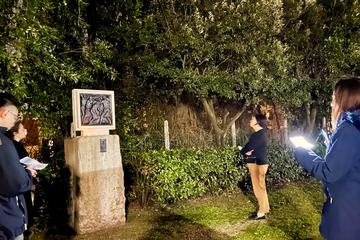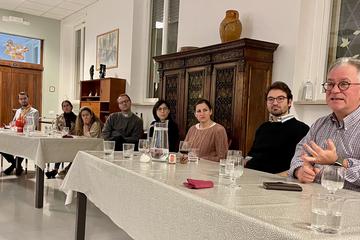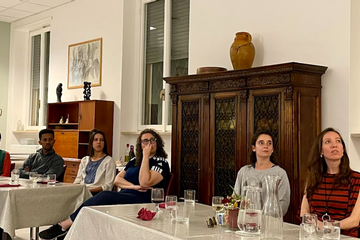
Merciful and vulnerable leaders are always more necessary, as they represent a revolutionary way of thinking about leadership. Keeping this in mind, from Oct.14 to 16, The Lay Centre community gathered in Frascati, a town in the Alban Hills southeast of Rome, for a weekend retreat led by Brother Emili Turú, FMS. Brother Turu is the former superior general of the Marist Institute and secretary general of the Union of Superiors General in Rome.
He based his reflections on two pillars: the Taizé icon of mercy, which represents different scenes from the Parable of the Good Samaritan, and Pope Francis’ social encyclical “Fratelli tutti.”
“Fratelli tutti” expresses the need for social convergence in a polarized and fragmented world. In the document, the pope invites all people to work together toward social cohesion and friendship, by following the example of Jesus who “challenges us to put aside all differences and, in the face of suffering, to draw near to others with no questions asked” (FT, 81).
In a world where often forceful and dominant leaders seem to prevail, going against the tide and proposing a model of honesty, transparency and courage to show one’s vulnerability is the response to the call to a love that includes everyone.
The meditations led by Brother Turú were also inspired by the Taizé icon of mercy, with Christ at its centre, surrounded by images that tell the Parable of the Good Samaritan (cfr. Lk 10:25-37). The icon was chosen by the Taizé community to celebrate the 100th anniversary of the birth of its founder, Brother Roger, in 2015. The icon depicts Christ in a way that is almost identical to the victim in the parable. In the scene, Jesus is attacked by robbers – whose position recalls Andrei Rublev’s icon of the Holy Trinity (a Trinitarian interpretation of Gen 18:1-16, the episode in which “three men” visit Abraham and Sarah and promise them a son).
While meditating on the Gospel passage, participants were encouraged to remember that, in order to be merciful to others, we first must be merciful to ourselves. They were encouraged to identify with the wounded Judean, the victim in the Parable of the Good Samaritan – more commonly Christians are invited to identify with and imitate the Samaritan – and to reflect on the questions: Who is the Good Samaritan for me, in my weaknesses and sorrows today? We must let Jesus – our Good Samaritan – take care of us and bandage our wounds. Only then can we think of being a Good Samaritan to others.
The retreat offered the space that is essential to generate a new perspective on oneself and on one’s neighbor, in a community that is being formed, where everyone is called to have a merciful attitude toward oneself and others.
The retreat was held at the Capuchin Friars retreat house in Frascati. Enjoying the gorgeous view of Rome from a distance – about 20 km away – it was possible to see the dome of St. Peter’s Basilica peeping through the fog. The silence of the surrounding hills, with the beautiful sunset over the vineyards nearby, facilitated meditation and personal recollection.
The biblical figure of Job in the Old Testament was another source of inspiration during parts of the retreat. Small group discussions were an opportunity to share personal stories and experiences. Brother Turu invited participants to live the virtue of hope, recalling the Conciliar document “Gaudium et spes,” which calls all people to embrace “joy and hope” and to take the road less traveled because it is also the road that Christ took.
Prayers organized by Lay Centre residents were opportunities to gather around the cross. The joy of being together brought a renewed sense of hope and a stronger feeling of the need to change the world starting with small daily gestures.
The retreat concluded with Mass, celebrated by Father Peter Lah, SJ, pro-dean of the faculty of social sciences at the Pontifical Gregorian University.
Contributed: Filip Veber
Photo courtesy Amanda Achtman


